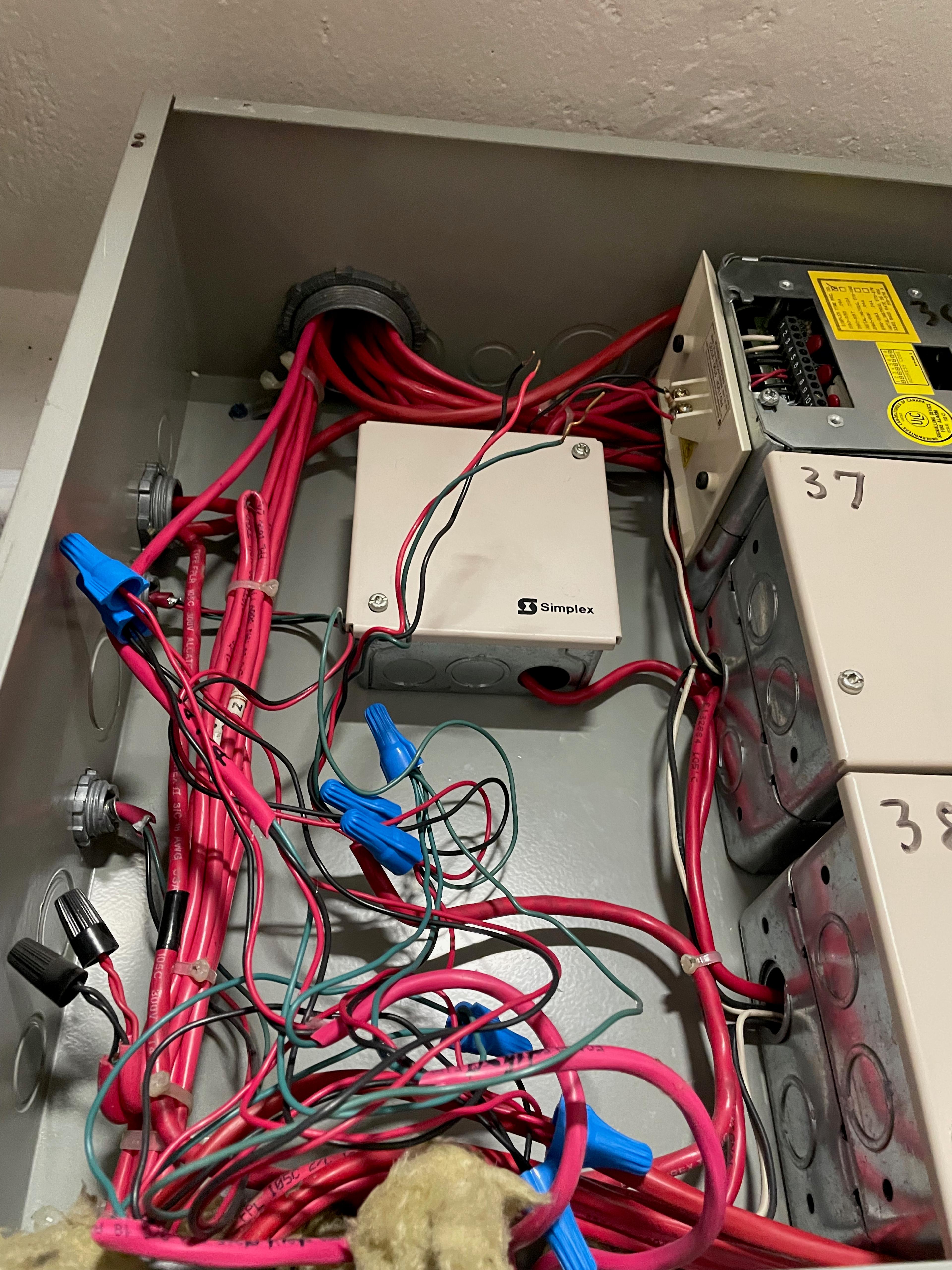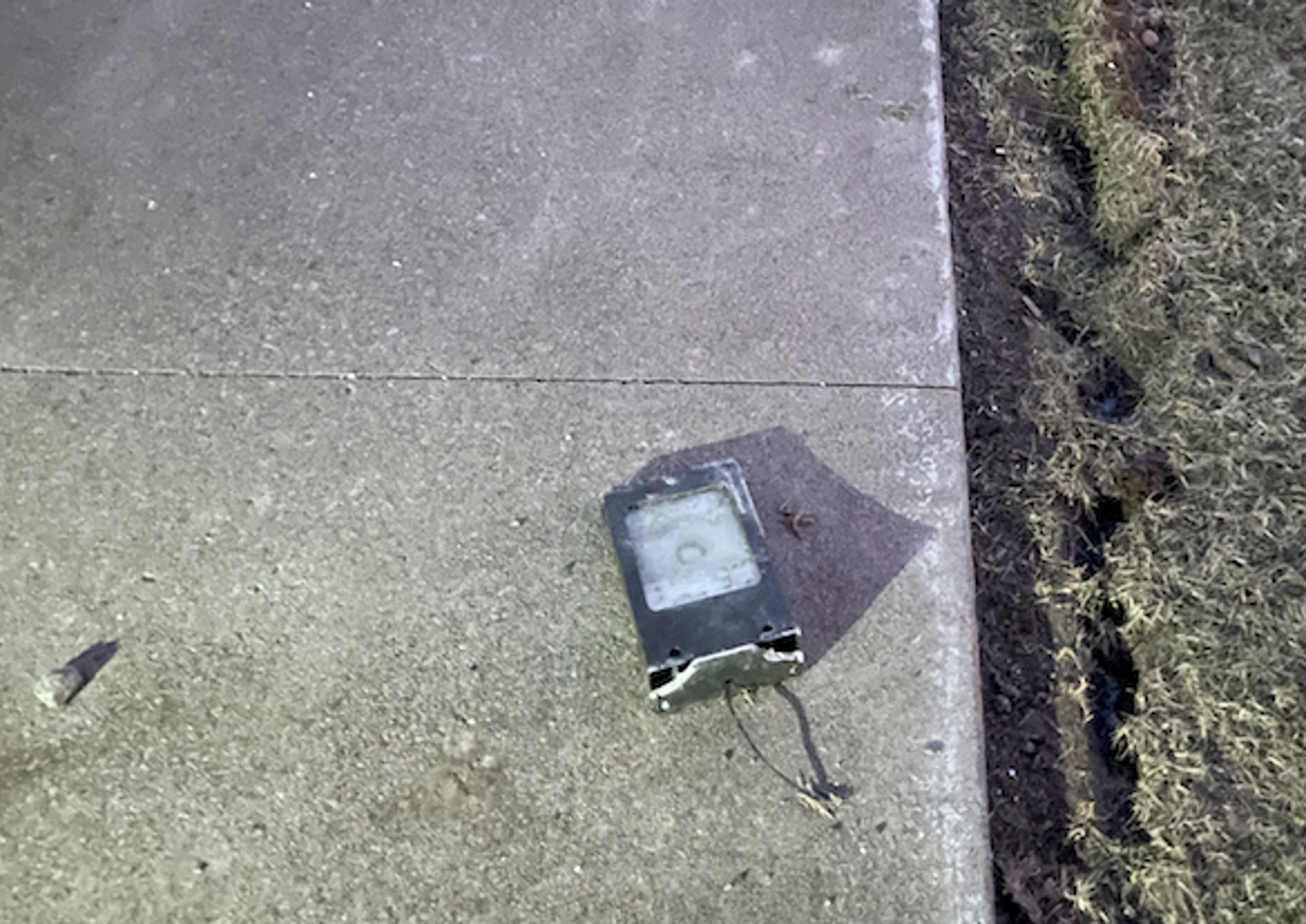Residents of the Rockhill apartments in Montreal
Archives
22 February 2024
The cold water now works. However there is still only the hose without a nozzle to wash.
22 February 2024
In the photo,

In the photo, the device labeled "Simplex" is a well-known brand that specializes in fire alarm and life safety systems. The device shown in the photo appears to be a fire alarm system component, possibly a power supply or a control communicator for the system.
The Simplex device is a white box mounted on the back wall of the cabinet, with multiple wires connected to it. This component is part of the network that monitors and controls the fire alarm system in your building. The wires connected to it likely lead to various sensors, alarms, and possibly to a central monitoring service. The Simplex unit would process signals from fire detection devices and then activate the necessary alarms or notifications according to the system's design.
The photo shows several wires with wire nuts, which are typically used to secure wire connections. Some wires appear to have wire nuts properly attached, but there are also exposed wire ends without caps, which could potentially be live depending on the configuration and whether power is supplied to them. Exposed electrical wires always present a risk of electric shock, which can lead to injury or even be fatal if someone were to come into contact with them, especially if the system is active and those wires are carrying current.
Additionally, there are other concerns with such setups:
- Fire Hazard: Improperly managed or unprotected electrical connections can overheat or spark, leading to a fire risk.
- System Reliability: Exposed wires are vulnerable to damage, which can affect the reliability of the fire alarm system or other critical building infrastructure.
- Code Violations: Electrical and fire safety codes typically require all connections to be insulated and protected to prevent accidental contact.
Leaving electrical wires exposed, even in a system that is not yet fully operational, is generally not considered best practice for several reasons:
- Safety: Even if the system is not operational, circuits can become energized during testing or by accident, posing a shock hazard to workers and others who may come into contact with the exposed wires.
- Damage: Exposed wires are more susceptible to damage from construction activities, environmental factors, or tampering, which could result in faults or short circuits when the system is eventually energized.
- Regulatory Compliance: Building codes and safety regulations may require that all electrical systems be left in a safe state at all times, even during construction or installation.
- Professional Standards: Leaving wiring exposed in this manner could be considered unprofessional, as it suggests poor workmanship and a lack of regard for ongoing safety.
Best practice would dictate that any non-active wires should be safely capped and stowed to prevent accidental contact. If the system is going to be left in an incomplete state for an extended period, it would be prudent to take measures to ensure safety and code compliance. This could include:
- Capping all unused wires.
- Securing wires to prevent contact.
- Clear labeling of wires to indicate their status (e.g., live, neutral, not in use).
- Ensuring that any energized parts of the system are clearly marked and protected
However, the wiring appears disorganized and not neatly bundled, which could be a sign of poor installation or maintenance practices. It's important for safety systems to be well organized and maintained to ensure reliable operation.
22 February 2024
On the notices sent by Minto, the signature indicates that it comes from a customer service team and that one can write to rockhillservice@minto.com.
However, when writing to this address, no response is received because this department does not exist as such; the email is forwarded to the administrators of Rockhill, who will follow up based on their availability and priorities.
The end result is that customer communications is not consistent and does not follow a continuous improvement process.
22 February 2024
Several tenants have come forward since the last meeting, reporting receiving notices for imaginary amounts.
Despite discussions with the administration, they continue to receive new notices every month. In some cases, the person in charge of the building had told the tenant that everything was fine and that they owed nothing, but a few days later, a new letter was sent to them.
21 February 2024
During the meeting with the administration on February 21, 2024, the CLR raised a coordination issue that makes it difficult to discuss rent increases.
The administration encouraged tenants to negotiate their renewals if they are not satisfied. However, there is a lack of organization that makes the process complicated and frustrating.
A tenant tried to schedule an appointment for her renewal. She called but had to leave a message on voicemail because no one answered. Someone called from Ottawa but did not speak French. Anyway, she was only calling to say that she would pass the message to someone in Montreal the next day. The day after next, as no one had called her back, she tried again and managed to speak to someone and schedule an appointment. When she showed up for the appointment, the Minto representative was not aware of it, but she received her anyway. The tenant obtained a reduction, but more importantly, a promise regarding the renewal conditions given her personal situation. However, the administration's representative refused to put this promise in writing. The tenant left with only the financial aspect in writing and experienced stress regarding other aspects of her lease. The lack of organization will create frustration, and people will simply show up at the office without an appointment if nothing is done.
The Regional Director will talk to the team to ensure that everyone uses shared calendars. He also agrees that promises should be put in writing, and if approval is required, then a follow-up will be done within 48 hours after the discussion to confirm the promise in writing.
21 February 2024
The Rockhill Tenant Collective (RTC) has reported several issues with the current snow removal service, particularly that the snow removal operator does not follow the established pathways, causing damage to the grounds around buildings A and B, as well as around the fountains. They also mention that the equipment used (a 6-foot plow) is too wide for the sidewalks (6 and a half feet), inevitably leading to overspill and damage.
Administration Response:
Mr. Contarini, the Regional Director for Montreal, explains that a specific department in Ottawa is responsible for service contracts, and warnings have been sent to the snow removal service provider. He also notes that, given the end of the snow season, changes to the service provider could only be considered for the following year, despite a 30-day notice clause in the contract.
It seems that some of the concerns were not known to Mr. Contarini or Mrs. Guttman, the Assistant Manager at Rockhill, both of whom expressed their intention to document the problems reported by the CLR, including taking photos of the damage.
Root Cause and Possibility of Resolution:
The main cause of the problems mentioned appears to be the choice of equipment used for snow removal and the manner in which the operation is performed. The RTC suggestion to use a narrower plow and to reposition the marker stakes to better guide the driver could represent viable solutions.
No specific resolution plan was formalized during this meeting. The administration wishes to clarify that any concrete action, including changing the service provider, seems postponed to the next year. No specific timeframe for implementing suggestions or improvements is given, and it appears there are no specific conditions regarding the quality of work and the responsibility for damages that would cause them to change providers, despite the RTC's exhortations.
21 February 2024
The Rockhill administration told the RTC that they have escalated the issue of the numerous billing errors and related unjustified notices of legal action. Unfortunately there is nothing concrete so far and the Montreal-based team is left without the ability to drive this process, as they cannot commit to any specific steps or timeframes.
The RTC reminded the administration of the level of stress caused by the numerous and frequently elderly tenants targeted without justification. This is particularly intolerable as the letters are sent multiple times in spite of having discussed the issues in person with administration representatives.
The administration was advised that, in light of the large number of invalid notices being sent out, a tenant could successfully argue to the administrative tribunal that they can no longer take those letters seriously since they regularly are sent by mistake.
The administration said that they were verifying the accounts one by one. The RTC countered that what tenants are looking for is a commitment to a change of procedures so that good tenants that pay their rents are not treated like delinquents through no fault of their own.
21 February 2024
During the meeting on February 21, 2024, the RTC brought up a particularly difficult point regarding communications.
Several emails had been sent since the last meeting, but the administration had not followed up on them, including those concerning electrical wires. Is this a sign of not wanting to respond or not having the time to respond?
The Regional Director assures that it was because there was not enough time.
The RTC mentions that if it's a matter of time, then it seems certain that it's necessary to request additional resources or to optimize processes.
The administration explains that they will indeed hire people to help, and that the assistant manager will be able to assist in the short term. They will be included in emails and meetings.
The RTC agrees that hiring someone who will be able to read client communications and coordinate with the team will be very beneficial, in order to be able to receive a response within 24 to 48 hours (and not just an automated one). When no response is forthcoming, it's assumed that the email was classified as low priority, especially since the emails in question were more informational in nature and not contentious, so would have been easy to respond to. Surely, understanding client questions, gathering information, and responding takes time, and if this time is not currently available, then it makes the problem critical.
21 February 2024
The CLR asked the Rockhill administration why the employee sent to pick up the lamp post that was knocked over on the path and crushed by the snowplow, left its lamp a few steps away on the path, and did not bother to pick up other lamp posts that were dangerously leaning. The administration had not followed up and was surprised by this blatant lack of judgment, and promised to discuss this with the maintenance department.

21 February 2024
During the discussion with the administration, the CLR argued that the snowplow tractor and equipment occupy two parking spots in front of building B, and visitor parking spots have been assigned to contractors. A few years ago, Rockhill tenants received a 2% rent reduction because the pool was closed. It's not written in the lease, but it's part of the factors considered for value, so having visitor parking is in the same vein. Therefore, there's a risk that tenants might ask for a reduction for these parking spots. The administration could place the equipment on the sidewalk and put the tractor in one of the other parking spots that has more room.
The Regional Director explains that Sylvia Guttman, Assistant Building Manager, is in charge of parking and takes note to find a solution.
Monday 9th of September 2024 at 7 PM
In the hall of building C
(next to the stores)
Have a question? An incident, photo or opinion for the website? An exchange with the administration to share? Write to us at:
Affected by the deterioration of the Rockhill Apartments in Montreal, some tenants began meeting in July 2023 to consider ways to address the situation.
From these meetings emerged the Rockhill Tenants Collective, a spontaneous group dedicated to upholding the rights of residents and the heritage value of this once upscale and avant-garde complex.

